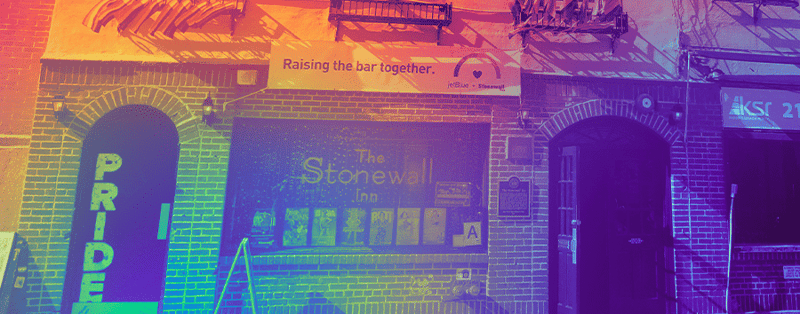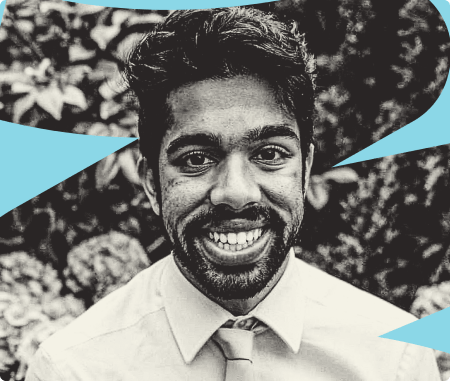Nonprofit spotlight: Telling queer history
 Gohar Chichian
·
4 minute read
Gohar Chichian
·
4 minute read

While Pride Month celebrates the LGTBQ+ community, nonprofits are hard at work year-round to provide key services and protections to ensure equity for the LGBTQ+ community. Local leaders and activists contribute to arts and culture, community and economic development, political advocacy and justice work, housing, health, education, and so much more. Catchafire seeks to amplify and lift up the voices of these leaders making an incredible impact on their communities.
As believers in the power of storytelling, we spoke with Rebecca, Founder and Executive Director of Telling Queer History in Minnesota. The mission of Telling Queer History is to connect Lesbian, Gay, Bisexual, Transgender, and Queer + people across generations and identities through storytelling gatherings, which bring communities together to foster compassion, empathy, and healing.
Tell us a little bit about your organization and how you got started.
This June will mark nine years since I founded the organization. The idea was brewing a year before that. I was working on a campaign fighting the homophobic language proposed in the Minnesota state constitution, which would outlaw marriage equality. We were the 13th state fighting this initiative.
We based our campaign on love and empathy by having volunteers call Minnesotans and ask them ‘What does love and marriage mean to you? Here is what it means to me. Where can we find a common ground?’ Instead of focusing on the political rights angle, we worked to frame the narrative for people who were moveable in the center of the spectrum. And it worked - we were the first state to defeat the amendment change. We saw it in action: stories are a tool for changing lives and connecting across differences.
Despite our political success, I also saw an opportunity for further change. The campaign focused on the upper middle class white LGBTQ+ population. Lower class community members were in immediate need of housing, employment protection, and safety on the streets. Millions went into fighting the political amendment instead of these key services. The LGBTQ+ community was divided across race, class, and generation, and there wasn’t a space where people were coming together to connect.
I had the idea that storytelling could help bridge the gap between generations, class, and race, and launched Telling Queer History. We provide four curated storytelling events a year to bring people together.
Ricardo Levins Morales is an organizer who is well known in the community, and he talks about nourishing the soil of the movement and I think that’s part of what we do as Telling Queer History.
Tell us about these storytelling events. Do you have a favorite form of storytelling?
Our storytelling style is primarily first person oral narratives. This past year was only virtual events, and for the first time, we created a theme for the entire program year centering around the intersections of justice. Over the past year, we held events around housing justice, environmental justice through art, and our annual fundraiser with ‘Fast Friends,’ an opportunity for everyone to connect. On June 12, we are holding an event on food and economic justice, which will celebrate our ninth anniversary and our first in-person event since February 2020.
Our storytelling style is not digging up the past, it’s not a history report. It’s about lived experience in history and listening to our leaders, elders, and youth with what they have learned and experienced. Live, in-person storytelling is very powerful. You can see how people gesture, how their eyes fill with water; it gives you perspective you can’t get in other ways.
What is one part of queer history that you wish more people knew about?
I don’t want to highlight a specific historic moment, but the fact that there is queer history everywhere. I grew up in Minnesota and knew there was queer history, but didn’t have access to it. We are everywhere and we need to find those stories and make sure they’re recorded. The main focus on queer history is always on Stonewall and their stance against police brutality, it’s commemorated every year, but this wasn’t the first instance.
Is there a volunteer from Catchafire that has stood out to you and made an impact on how you work?
Volunteers on Catchafire have a better system of accountability. The timeline and expectations are always very clear. For example, I didn’t know how to project manage an annual report, but I figured it out with the help of volunteers. A copywriter and designer helped us design our first annual report. The next year, the same designer volunteered outside of Catchafire to help with the annual report again, saving us a huge amount of money.

I learned a lot through his process and what he needed as a designer. Because I learned what was needed to make the report, we went from getting it done in three months the year before to three weeks the year after.
We also had a volunteer on Catchafire edit videos for our April fundraiser about why our donors give, why telling stories matter, and why our gatherings are substance free.
Tell us about your experience in Catchafire’s Executive Director support group. How has this group supported you and your work? What learnings and takeaways has it provided?
St. Paul & Minnesota Foundation gifted Catchafire to us at just the right time. In particular, I’m so grateful for the Executive Director support group because they have absolutely been a lifeline for me. I work from home and live alone so seeing one another online every other Wednesday creates a space of accountability where we cheer each other on, complain about nonprofit issues, think of different approaches to try, and feel seen and understood. We have created a really vulnerable space, with a constant focus on self care. One of the other Executive Directors is also in Minneapolis and offered a service for our online auction last year, which was great. Having this group helps shape how we work and what success looks like.
What are the ways in which people can get involved to support Telling Queer History? Are there any key initiatives your organization will be promoting during Pride Month?
Join us for our event on June 12. Celebrate with us in person if you’re local, or tune in to the livestream to watch. Our other events will be in the fall.
We’re always happy to have more Board members. We reserve seats of power for those in the LGBTQ+ community. We’re currently looking for cisgender men, folks who are 50+, and those who love fundraising to add more perspectives to our team.
Funding us is always helpful. Sustaining donors are the backbone of our work. Support Telling Queer History as a sustainer or make a one time gift here.
I’m open to collaborations and connections. If you have an idea around building our programming (for example, we’d love to create a podcast down the line), then let’s have a conversation. To volunteer, join the Board, or share resources, contact us at hello@tellingqueerhistory.com.
Sign up to volunteer for Telling Queer History today.



